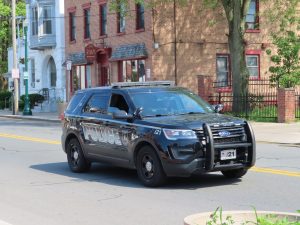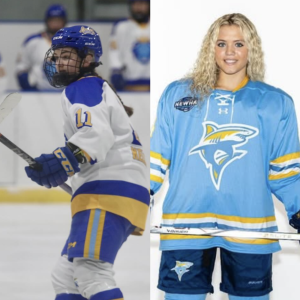Union Students to Tutor Ukrainian Children
October 6, 2022
On September 24, Professor Kristin Bidoshi, Director of Russian and East European Studies, held an interest meeting for student volunteers looking to remotely teach Ukrainian students English. The project, for Ukrainians in Lviv, Kyiv and Kharkhiv, will start October 8 in partnership with Ukrainian school Green Country, which has an office in Kyiv. The program will run till November 11 or 12, according to organizer Anton Tatus ‘24. Ukrainian tutees will be taught in age groups 6–8, 9–12 and 13–16.
According to Bidoshi, the students speak English “pretty” well but “want practice with native speakers” on more conversational and colloquial English, as well as pronunciation. One lesson Bidoshi showed at the meeting included describing a profession and asking tutees to name it. Union, according to Bidoshi, is the “only college in the US that is doing something like this.” She hopes the program will expand to cover all three terms this year.
Tatus, born and raised in Kyiv before attending Union, was highlighted by Bidoshi as “spearheading” the effort, though he credits Bidoshi for “95 percent of the work.” Tatus began the program with a “dry run” in June after receiving a Ukrainian contact’s request for English tutors for students that “had no time over summer to learn.” He reached out to Bidoshi, who he met virtually his first year and remembered for her efforts in programs to aid Ukraine since the invasion. Bidoshi found tutors, including her daughter, and the first functional version of the program partnered with a summer camp and lasted “a little bit over a month [or] two months”, according to Tatus. He noted that the first program “worked out well overall, but we didn’t like how that school organized everything.” He recalled that the first school “didn’t reach out in a timely manner to [say] what type of topics they wanted covered.”
“Students now,” he says, “know exactly what they need to be prepared for, rather than just ad hoc stuff.”
The current program with Green Country began with Tatus asking Ukrainians that he knew for schools that might be interested. His Green Country was found by his mother, who knew the school’s owner. Tatus made sure that Green Country had enough interested students, and from there he says Bidoshi “played a huge role” in communicating with the school and “did everything on her own” to organize program details. Tatus says the current program has 16 tutors, which is “much larger’ than the summer program.
The main thing Tatus wants Ukrainians to take from the program is learning English from a Native speaker: “[y]ou can learn grammar and vocab on your own if dedicated enough, but having access to a native speaker who is not necessarily professional” is “a huge value.” He notes that in Ukraine “you learn English in a very academic, specific way, but this [program] can help [tutees] learn more useful day-to-day English.” He hopes the experience will be valuable for the youngest age group, who are “just getting exposed to well-spoken fluent English,” as well as the other age groups which “should be more proficient.”
Tatus’s own experiences with English in the US have informed his goals for the program. As he recalls: “I had really good fundamental knowledge of the language. My vocab and grammar were enough to write and read fluently.” But, “[w]hen I went to the US freshman year, I had a huge difficulty comprehending what people said and trying to express myself[…] listening to fluent, fast English and having to try to express yourself to someone who just speaks English[…] is a huge help. The only way to know how to speak is to speak. Pre-recorded stuff [like film] is good, but life is better. [The program] is going to be a huge benefit for anyone who gets a chance.” He also noted the valuable step of immersion in a foreign language: “What comes six months after immersion is that you’re able to understand. I’d love this for the children.” If tutees can, “for the short months,” learn to speak like the tutors, it would be “absolutely wonderful,” says Tatus.
Tatus’s goals for the program going forward focus on expansion and getting more schools and students involved; “I’d love to have a chance to provide this to people who need it the most. If it works well we can scale it up.” Currently, the program requires a fee from Ukrainian participants, proceeds from which are donated to Ukraine’s army. “We tried to organize it so that no payment was needed, for equity, but it proved to be almost impossible.” If the program were free, says Tatus, “too many people would be signing up to accommodate.” Though, says Tatus, an eventual payment-assisted or free plan might be worked out.
“Students now,” he says, “know exactly what they need to be prepared for, rather than just ad hoc stuff.”
The main thing Tatus wants Ukrainians to take from the program is learning English from a Native speaker: “[y]ou can learn grammar and vocab on your own if dedicated enough, but having access to a native speaker who is not necessarily professional” is “a huge value.” He notes that in Ukraine “you learn English in a very academic, specific way, but this [program] can help [tutees] learn more useful day-to-day English.” He hopes the experience will be valuable for the youngest age group, who are “just getting exposed to well-spoken fluent English,” as well as the other age groups which “should be more proficient.”
Tatus’s own experiences with English in the US have informed his goals for the program. As he recalls: “I had really good fundamental knowledge of the language. My vocab and grammar were enough to write and read fluently.” But, “[w]hen I went to the US freshman year, I had a huge difficulty comprehending what people said and trying to express myself[…] listening to fluent, fast English and having to try to express yourself to someone who just speaks English[…] is a huge help. The only way to know how to speak is to speak. Pre-recorded stuff [like film] is good, but life is better. [The program] is going to be a huge benefit for anyone who gets a chance.” He also noted the valuable step of immersion in a foreign language: “What comes six months after immersion is that you’re able to understand. I’d love this for the children.” If tutees can, “for the short months,” learn to speak like the tutors, it would be “absolutely wonderful,” says Tatus.
Tatus’s goals for the program going forward focus on expansion and getting more schools and students involved; “I’d love to have a chance to provide this to people who need it the most. If it works well we can scale it up.” Currently, the program requires a fee from Ukrainian participants, proceeds from which are donated to Ukraine’s army. “We tried to organize it so that no payment was needed, for equity, but it proved to be almost impossible.” If the program were free, says Tatus, “too many people would be signing up to accommodate.” Though, says Tatus, an eventual payment-assisted or free plan might be worked out.






